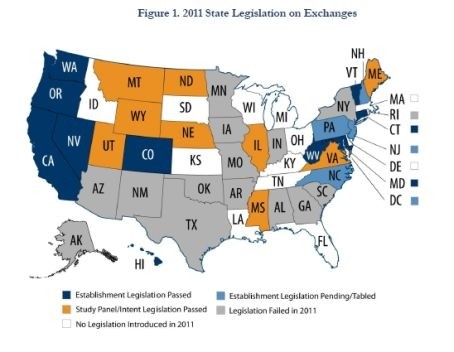Health Reform Implementation in One Map
Resource type: News
The Washington Post | [ View Original Source (opens in new window) ]
By Sarah Kliff
Where are we in setting up the health reform law? We are, as you can see below, literally all over the map:

(Center on Budget and Policy Priorities)
Even though the Affordable Care Act establishes that every state must have a health exchange — an insurance marketplace, which will launch in 2014 — most states need to pass legislation to create the authority to set up the marketplace. The above map, sent to us by the Center on Budget and Policy Priorities, shows where states are in that process. And perhaps more interestingly, it shows that you can’t predict where states are in that process by looking at the party that controls them.
An accompanying CBPP analysis shows 33 states have considered bills to establish a health exchange; 10 of those have passed. An additional nine states have approved bills that do not necessarily establish an exchange, but do declare the state’s intent to do so. A dozen states have not considered any exchange legislation.
A few interesting things to note here: The map doesn’t break down nicely on party lines. States that have passed exchange bills tend to lean Democratic, but it’s by no means a clear dichotomy. Both Nevada and California passed exchange bills under Republican governors; Mississippi and Idaho have, over the past few weeks, become increasingly aggressive about setting up exchanges.
Conversely, not all Democratic-controlled states are moving. Delaware and Rhode Island’s state governments are both controlled by Democrats. Neither has moved exchange legislation. Even here in D.C, an exchange bill has sat in committee since its introduction in February.
The second takeaway, I think, is that Health and Human Services has a lot of work cut out for it. The federal government will set up an exchange in any state that does not do the work itself. Only two states that I know of, Florida and Louisiana, have expressly stated they won’t build the marketplace. But there are a whole lot of other states in the gray area above that could fall either way. If a few larger ones like Texas or New York aren’t able to move forward in the next year or so, that’s going to have the federal government playing a really big role in setting up what was meant to be a state-based law.
Center on Budget and Policy Priorities is an Atlantic grantee.